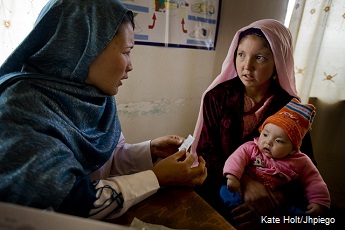Postpartum Family Planning
MCSP defined postpartum family planning (PPFP) as: The start of a modern method of contraception as soon as possible after childbirth and the continued use of this or another method for at least two years for optimal timing and spacing of pregnancies.
PPFP can also be adopted to limit future births, a recommendation that should be included when counseling women with more children or older women. Moreover, the definition above carries programmatic implications: in order to initiate FP early enough to prevent an untimely, and likely unintended, pregnancy, programs must use new strategies to reach women. These strategies principally involve either community-based care and/or integration of facility-based care.
MCSP effectively supported countries to implement a number of strategies — from antenatal and postnatal care and day of birth initiatives, to strategies that reach women in the extended postpartum period (such as those related to maternal, infant and young child nutrition, and immunization). Furthermore, in a study in Ethiopia, MCSP rigorously studied the effects of integrating PPFP at every contact point from pregnancy until the child is fully immunized.
(Click here to meet Nurse Marian, who knows that the sexual and reproductive health needs of her clients come first.)
Maternal mortality is lower among women who have fewer children, and maternal deaths increase with advanced maternal age; therefore, women with more children and older women are a particular focus. MCSP worked to expand access to both postpartum and interval care for tubal ligation and no-scalpel vasectomy — as well as long-acting reversible contraception — to increase choice and allow for engagement with men, while reaching high-risk women who may be interested in spacing and limiting.

